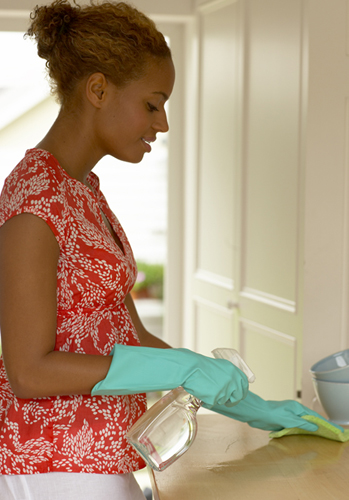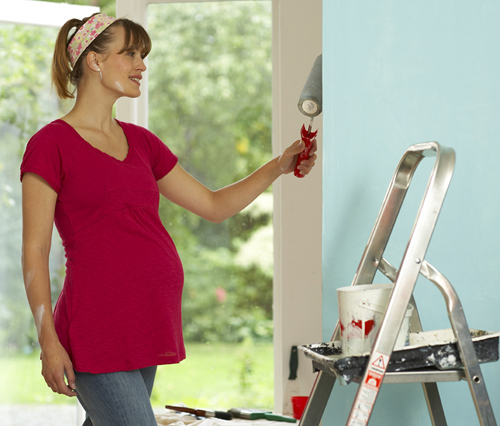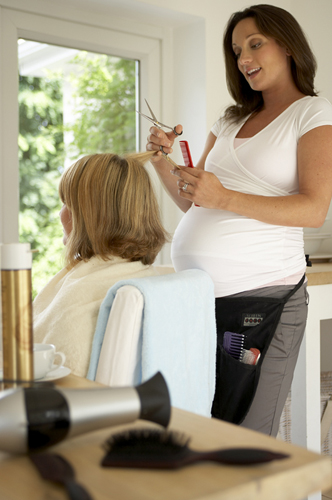Pregnancy can be beset with anxiety about potential hazards. Being aware of exactly what to avoid will help to allay fears.
Whether you’re pregnant
or are planning to conceive, now is the time to do a safety check on
your social habits and home and work environment. Anything that could
affect your well-being could affect your baby too, especially in the
first trimester. However, don’t become overly anxious. Instead, arm
yourself with the facts so that you can avoid hazards, but also relax
and enjoy your pregnancy.
Your social habits
The decision to have a baby may inspire you to review your social habits and, if necessary, make changes.
Alcohol consumption
Alcohol consumption
You should stop drinking alcohol while trying to get pregnant and once
you’re pregnant according to the US Surgeon General. There is no known
safe consumption level for pregnant women, so abstaining from drinking
is the safest option. What isn’t in doubt is the damage caused to the
fetus by excessive alcohol intake. Continuous heavy drinking in
pregnancy can lead to a condition known as fetal alcohol syndrome. The
effects of this include retarded growth, facial and joint abnormalities,
and heart problems.
If you drank in the
weeks before you knew you were pregnant, try not to worry, but stop now.
Many women also decide to give up alcohol while they’re trying to
conceive to optimize fertility.
Smoking
Ideally, you should
stop smoking before you get pregnant. If you’re still smoking once you
conceive, try to stop right away. If your partner or friends smoke, ask
them not to smoke in your home or anywhere near you. Inhaled cigarette
smoke interferes with the supply of oxygen to the baby, which can lead
to a low birthweight and increases the risk of stillbirth or the death
of a baby in the first month of life.
Recreational drug use
In addition to
damaging your own health, recreational drugs are not advised in
pregnancy since some pose dangers for the fetus and others carry a range
of possible hazards.
Heroin and cocaine
are damaging both to a pregnant woman and her unborn baby. These drugs
stunt fetal growth, affect the placenta, and can cause miscarriage or
premature birth, as well as health problems in the newborn. Babies born
to women who use heroin often show drug withdrawal symptoms. A report on
ecstasy linked the use of this in pregnancy to a rise in birth defects,
such as limb abnormalities. The specific effects on the fetus of
amphetamines and LSD are unclear, but it’s safest to avoid them.
The direct effects on
the fetus of the active chemicals in marijuana are not clear, but
smoking the drug involves the same risks as tobacco smoking.
Hazards at home
Many of us use chemicals
daily in and around the home. In addition to personal products, such as
bath oils, deodorants, and hairsprays, we also keep dozens of other
substances around the home, including cleaning fluids, detergents,
bleach, and air fresheners.
When products are
used in accordance with the manufacturers’ instructions, there is little
chance of them causing harm in pregnancy. However, minute traces of
chemicals can enter the bloodstream, either through the skin or by
inhalation, and cross the placenta. While there is no hard evidence to
show that this has an ill effect, it makes sense to minimize the chances
of chemicals from reaching a developing baby.
When using products,
wear rubber gloves to prevent skin contact and ventilate rooms. To avoid
inhaling mists or vapors, choose nonaerosol products. Also, choose
products recommended for their low environmental impact, which contain
fewer chemicals. Where possible, use natural alternatives to chemicals.
Wearing rubber gloves when using household cleaning products will reduce your exposure to chemicals.

Painting and decorating
It’s important to stay
safe while doing home projects. Don’t climb up ladders or stand on
tables to reach high places since your belly alters your center of
balance. Also avoid skin contact or inhalation if you use oil-based
paints; spray paints; paint strippers; floor varnishes; and sealant
adhesives. Make sure rooms are well ventilated while decorating, and,
ideally, get someone else to do the decorating.
Opt for “greener” paints and keep rooms ventilated while decorating.

Pets and infections
Certain infections that
could harm the fetus can be picked up from pets. The parasitic infection
toxoplasmosis is spread through contact with cat feces. It may produce
flulike symptoms, or no symptoms at all, and many unknowingly acquire
immunity through previous exposure. However, although it rarely happens,
contracting toxoplasmosis for the first time in pregnancy can cause
serious problems, such as miscarriage or birth defects. Other pets, such
as dogs, caged birds, and turtles can carry salmonella bacteria.
Salmonella infection doesn’t directly harm the baby, but can make a
pregnant woman ill.
Being scrupulous about
hygiene helps you avoid such infections. Wear rubber gloves when
handling a cat litter box, cleaning cages where animals are kept, or
disposing of dog feces, then wash your hands (and the gloves) afterward.
Wear gloves also for digging or weeding in case animals have defecated
in the garden. Or get someone else to do these tasks.
Toxoplasmosis and
salmonella can also be contracted from eating undercooked or raw meat or
eggs, so be careful with kitchen hygiene and cooking.
Workplace hazards
It’s the legal
responsibility of your employer to provide a safe environment. In
pregnancy, being aware of your rights can help protect you and your
baby.
In recent decades, women
worried about whether working at a computer screen put their babies at
risk. It’s now clear that using a VDT (as well as photocopiers and
printers) is safe. Some environments do pose possible dangers. If you
work in a health-care setting with ionizing radiation or
cancer-treatment drugs, inform your department that you’re pregnant, so
that if necessary, you’re given alternative duties.
Women employed in
places such as hairdressers, manicure salons, labs, and craft workshops
may be exposed to toxic chemicals. Working around some dry cleaning
solvents has been linked to miscarriage. It’s up to employers to ensure
protection from hazards. If you’re unhappy about conditions, talk to
your boss or HR manager.
Standing on your feet all
day and physical work that involves heavy lifting can be exhausting in
pregnancy. If your work involves either of these, ask if it’s possible
to switch to less tiring tasks.
If your job involves handling chemicals, ensure that a risk assessment is done and that you are able to avoid harmful substances.

| Q: |
Is it safe to use a cell phone during pregnancy? I’ve read that phones emit radiation.
|
| A: |
The radiation emitted by cell phones is “non-ionizing.” This is
not the same as the radiation received from X-rays, which can be harmful
in large doses. There is no evidence to show that using a cell phone is
a health risk to either you or your baby.
|
| Q: |
I go swimming twice a week and love the feeling of having the
weight taken off my belly! But is the chlorine in the pool bad for my
baby?
|
| A: |
In the past there has been some debate about whether it’s safe
to swim in chlorinated pools during pregnancy. However, now most experts
believe that swimming in chlorinated water does not pose any health
risks for pregnant women and their developing babies. You may find that
the smell of chlorine might add to your nausea if you are suffering from
morning sickness, although this is less of a problem in an outdoor
pool. Try not to swallow the water, and shower when you come out of the
pool. Swimming has great benefits during pregnancy. It has a low risk of
injury while providing a good cardiovascular workout and improving
muscle tone, so don’t be put off by unnecessary worries.
|
| Q: |
Is it OK to use nicotine patches or gum while I’m pregnant?
|
| A: |
Nicotine is known to decrease the blood supply to the fetus.
This could affect the baby’s growth, especially in early pregnancy.
Although tobacco substitutes such as patches, gum, and lozenges deliver
less nicotine to your body than smoking, you should never use them
without a doctor’s advice. Ask your doctor for information on safer ways
to beat cigarette and nicotine cravings.
|